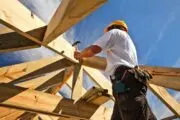When luxury real estate firm The Agency expanded operations into Canada in 2018, Jason Binab was chosen to lead the charge. That expansion has continued recently, opening offices in Calgary in July and Vancouver in August. The Agency also has three Ontario branches, operating in Kitchener, Oakville and Toronto.
Based in Victoria, Binab brings a personable, high-energy presence as managing partner of The Agency’s British Columbia offices, totalling more than $1 billion in sales during his 17 years in the business. His co-managing partner in B.C., Brian Danyliw, spearheaded the new Calgary office, utilizing experience gained during The Agency’s initial foray into Canada.
An aspiring actor before transitioning into real estate, it’s no surprise Binab finds himself comfortable in front of the camera, utilizing video and social media to expand his network of high-end clients.
Livabl spoke with him about how he finds balance, remaining positive through the pandemic, and his thoughts on B.C.’s recently announced cooling off period.
You have an extensive history in real estate working with RE/MAX, Macdonald Realty and Engel & Völkers before joining The Agency. What drew you to real estate?
I used to bartend in Vancouver back in the early 2000s. I was trying to be an actor for five years there and I would go to acting classes a couple times a week and whatever auditions popped up, and a woman named Deborah Gold used to come in and would always say “You have a great personality, would you ever be interested in real estate?” She gave me the information and told me where to sign up, so she initially got me into it.
But there was another realtor in Vancouver named Paul Eviston that I’d met — I coached his kids in hockey and got a taste of his success and saw what a good personality could provide. I knew I was a hard worker who has a good personality and cares about people, so I felt it was a good fit and transitioned from trying to be an actor to real estate.
You opened the first Canadian office of The Agency in 2018. What was that transition like?
The transition was interesting in the beginning because I was at Engel & Völkers, a great company, and got along really well with Scott (Piercy) and Jim (LeBlanc) and told them I was leaving to start my own thing, so I was going to be their competitor. Typically in real estate the minute you say that most companies sever ties and say “get the hell out,” because why would they leave you around to tell everybody about some great new thing you have going on? But they were great — they allowed me the time I needed to transition and I’m very thankful for that.
When I came on board the important thing was that I was doing well enough that I didn’t come in needing 20 realtors or else I’d go broke. My business partner and I put together a business plan and I was able to open up shop, find a space, go through the renovation process and organically grow. I never picked up the phone and started cold-calling people — if I did a deal with someone who seemed like a great guy and we enjoyed each other’s time I’d ask if they were interested in knowing about The Agency, and if not no problem.
Anybody who’s joined me has either called me from another company or I’ve taken on new realtors, and in this business most companies don’t take on new realtors because they’re liabilities or require additional time. The biggest thing we’re fighting for in this business is time.
How do you find balance in your personal and professional life?
Balance is this quest that we’re always on when you’re an A type and driven. I want to give so much to everybody else, sometimes you have to give back to yourself because you can drain your own battery trying to keep everybody happy.
I’ve shifted my focus to listings. Over the last 17 years I’ve realized that you can’t go after both listings and buyers because you spread yourself thin. I don’t turn down buyers, I try to match them with someone who would be a good fit for them. That helps achieve balance in real estate and balance in life.
Marketing and branding is an essential part of the business, and you’ve embraced that through television and YouTube, including your Rides with a Realtor video series. How have those initiatives benefitted you?
In 2012 I started working with a business coach and we focused on my goal to be the No. 1 realtor in the luxury space in Victoria, doing less sales and making more money so I had more time and balance. Part of working smarter was shifting the focus to luxury properties, so when you look at my branding it’s consistent, and the marketing attracts the people I want to work with.
Through strategic marketing I attract like-minded people and it helps grow the business. Approximately 20 to 30 per cent of my listings, the first point of contact comes from Instagram. I’ll put things out there before listing and realtors will reach out for more information, so social media has been powerful for me.

While Victoria didn’t have the same COVID numbers we saw elsewhere in Canada, what were some of the biggest challenges you overcame and lessons you learned during that period?
I think the biggest challenge was the mental aspect early on, not getting caught in the hamster wheel of initial fear over the pandemic when people didn’t know what was going to happen. We were doing weekly meetings with The Agency and had to remind people that it wasn’t the end of the world. It’s real estate — people need to buy and sell for life, death, divorce, expansion, relocation, whatever the reason might be, and that’s not going to change.
Around two months into COVID the phones started ringing again. Realtors who have listings are always going to be eating. If you have buyers you’re going to be starving. Once sales started picking up again I realized that human nature was kicking in. If you take something away from us we’re going to respond with fight or flight, and if you take away someone’s ability to travel they’re going to look closer to home.
We had the benefit of being here in Victoria, where the case numbers were relatively low and the weather is great, so COVID made Victoria an even more attractive market. I think the pandemic showed us a different side of human nature. It made people more skeptical and motivated them to position themselves well if something like this ever happens again.
How have buyer preferences changed during the last 18 months? And how does the Victoria/Vancouver Island market compare to other cities across Canada?
The high-end market went crazy, so people with money are now spending it. Waterfront properties used to be relatively cheap in Victoria and now they aren’t, so we’ve seen increased demand. We’re also seeing inventory at an all-time low here — I think we’re at 998 listings versus around 2,000 last year, so we’re at 50 per cent of last year, which was a drought compared to the previous year. The global market seems to be the same thing: low inventory, high demand, and the luxury market in most places has gone off.
Victoria has never been a boom-or-bust market. In Vancouver we’ve seen the market up 40 per cent, down 20 per cent, up 30 per cent, down 15. Calgary and Toronto have been more boom-or-bust as well, whereas Victoria has always been slow and steady wins the race with a five per cent increase per year, prices double every 10 years or so, and some years we’d see a 10-to-20 per cent uptick and then it would come down 10. But since 2016 the market has almost doubled. You used to be able to buy a teardown in Oak Bay for $600,000 and now they’re going for $1.3 to $1.4 million.
I think the number of sales over $3 million the year before COVID might have been 29, and then in the last six months of 2020 I think we had 58. Double the sales we had during 12 months in a normal market, so the high end is exploding.
What’s your reaction to the B.C. government’s recent announcement introducing a cooling off period?
A cooling off period doesn’t make sense to me because it goes against the free market. If you want affordability it comes from density, and density comes from local zoning. If the provincial government mandated density, turning unused farm land into homes, all of the sudden you’re bringing the prices down and softening the market through supply. Supply and demand is the easiest concept in the world, yet they try all these tax mechanisms and it makes no sense.
The only way to create affordability is more product. We need more subdivisions, we need small-lot subdivisions. In some areas in Vancouver you can have a 3,300-square-foot lot, but you can’t have that in Oak Bay or Victoria unless it’s a corner lot or meets certain requirements. If you have two houses on one lot you have more listings, so a house that would have sold for $1.7 million has to come down to $1.5 million, then you’re softening the prices.







